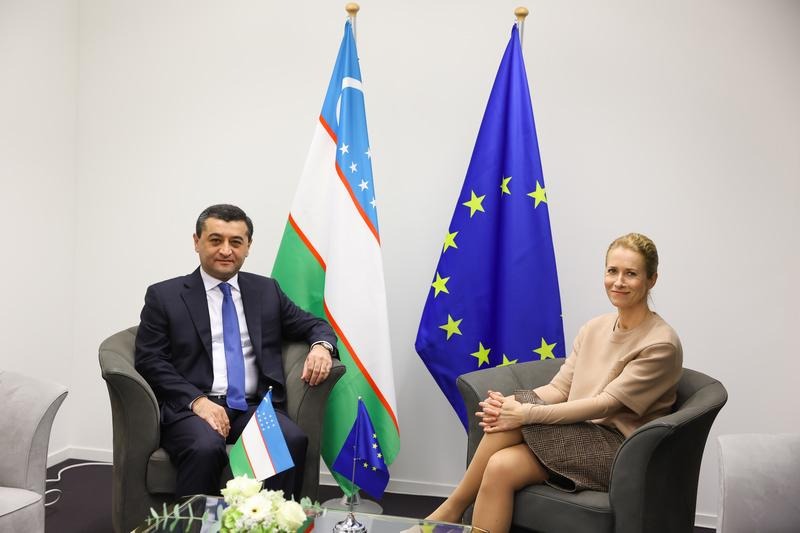
Uzbekistan and European Union Sign Cooperation Agreement
Uzbekistan and European Union Sign Cooperation Agreement
Executive Summary:
- The European Union and Uzbekistan signed an Enhanced Partnership and Cooperation Agreement (EPCA), replacing the framework governing Brussels–Tashkent relations since bilateral ties were officially established in 1999.
- The expanding ties between Uzbekistan and the European Union are indicative of Brussels’s changing approach toward Central Asia, which now places more emphasis on commercial and trade opportunities.
- Along with trade and connectivity, the European Union is interested in Uzbekistan’s green energy potential, and Brussels is eyeing the Caspian basin for alternative energy resources.
On October 24, Uzbekistan and the European Union signed an Enhanced Partnership and Cooperation Agreement (EPCA). The agreement is far more expansive than what governed the Brussels–Tashkent relations since bilateral cooperation was officially established in 1999 (European Council, October 24). The previous engagement framework no longer addressed today’s challenges, and both sides urgently needed an upgrade. Uzbekistan has grown economically, Central Asia has become more important, and the European Union is eager to diversify its energy dependence.
The expanding ties between Uzbekistan and the European Union are indicative of a changing approach in Brussels’s foreign policy. The European Union has become increasingly adaptable to the needs of each Central Asian country. In many ways, this mirrors how the People’s Republic of China (PRC), Russia, and, more recently, the United States have engaged with Central Asia. The November summit between the United States and the five Central Asian countries is a good example of this developing trend (Novaya Gazeta, November 14). To highlight the growing attention the European Union now pays to Central Asia, the EPCA follows the Central Asia–European Union summit held in April in Samarkand, during which Brussels pledged around 12 billion euros (about $13.9 billion) within its Global Gateway framework for infrastructure development in the region (European Commission, April 3; Invexi, April 4).
The alternative—a pursuit of a pan-regional approach—would have relegated the European Union to a marginal actor in Central Asia. The PRC’s and Russia’s geographic proximity increases their trade, investment, political, and cultural influence in Central Asia (see EDM, October 30, 2024, April 3, July 3, 9). The United States has also made significant moves to elevate its position. The European Union, too, can wedge itself into the region, given Central Asian countries’ willingness to diversify their foreign policy and thereby limit over-dependence on Moscow and Beijing. Brussels is well-positioned to serve as a pivot for Central Asian countries in education, infrastructure investments, and even governance models (Anadolu Ajansı, April 4; Gazeta.uz, October 28).
The growing momentum in relations with Uzbekistan also follows the European Union’s similarly expanding ties with Tajikistan and Kazakhstan. Dushanbe and Brussels initialed an EPCA in July, replacing the Partnership and Cooperation Agreement that governed bilateral relations since 2010 (Delegation of the European Union to Tajikistan, July 18). A similar agreement was signed with Kazakhstan in 2020 (Times of Central Asia, July 30). The new strategic partnership between Uzbekistan and the European Union mainly focuses on reviving commercial and political ties. The more practical aspect of Brussels’ interest, however, is the need to keep Europe’s automobile industry alive and free of dependence on the PRC’s near-monopoly on critical resources, which it can use as a geopolitical tool to pressure the European Union into making concessions (DW, February 2).
Another area of cooperation with Uzbekistan is green energy. The European Union is increasingly interested in the Caspian Sea basin and Central Asia’s alternative energy resources. This would be exported through the South Caucasus, and in 2022, the European Union signed a major agreement with Azerbaijan, Georgia, Hungary, and Romania to establish such an export route (European Commission, December 17, 2022). Cooperation in green energy is now one of the components of EPCA.
The Middle Corridor, which stretches from the Black Sea to the PRC through Central Asia, eschewing Russia and Iran, is another area of mutual interest for the European Union and Uzbekistan. For many, Uzbekistan might not be directly associated with the route, as the country lacks sea access, and the corridor presently mostly runs through Kazakhstan and the South Caucasus. The much-anticipated China–Kyrgyzstan–Uzbekistan railway aims to enhance Uzbekistan’s transit capabilities and establish much-improved regional connectivity (see EDM, November 11, 2021, July 17, 2024, April 8; Qazinform, December 21, 2024). Given Uzbekistan’s active ties with Azerbaijan and Georgia, Tashkent is well-positioned to secure a key transit role in the region (see EDM, November 12).
Uzbekistan and the European Union are also growing their bilateral trade. In 2024, bilateral trade reached 4.8 billion euros (about $5.5 billion), almost double the figure since 2020 (Euronews, October 24). Major European textile and logistics companies are present in Uzbekistan, and the European Union is seeking to expand its presence in the country’s commercial and investment markets. The EPCA prescribes expanding cooperation, streamlining customs procedures, and improving the investment climate to attract European companies. Another aspect of the EPCA is increasing visa facilitation, which would expand travel and work possibilities in the European Union. This might take a long time, as in the case of Kazakhstan, where negotiations on a visa agreement began only in March 2025, nearly five years after the 2020 agreement (Gazeta.uz, November 10).
The EPCA with Uzbekistan is another step in the European Union’s push into Central Asia. Given intensified competition from Russia, the PRC, and the United States, the European Union is set to become more geopolitically minded, positioning it as a major partner in Central Asia.


